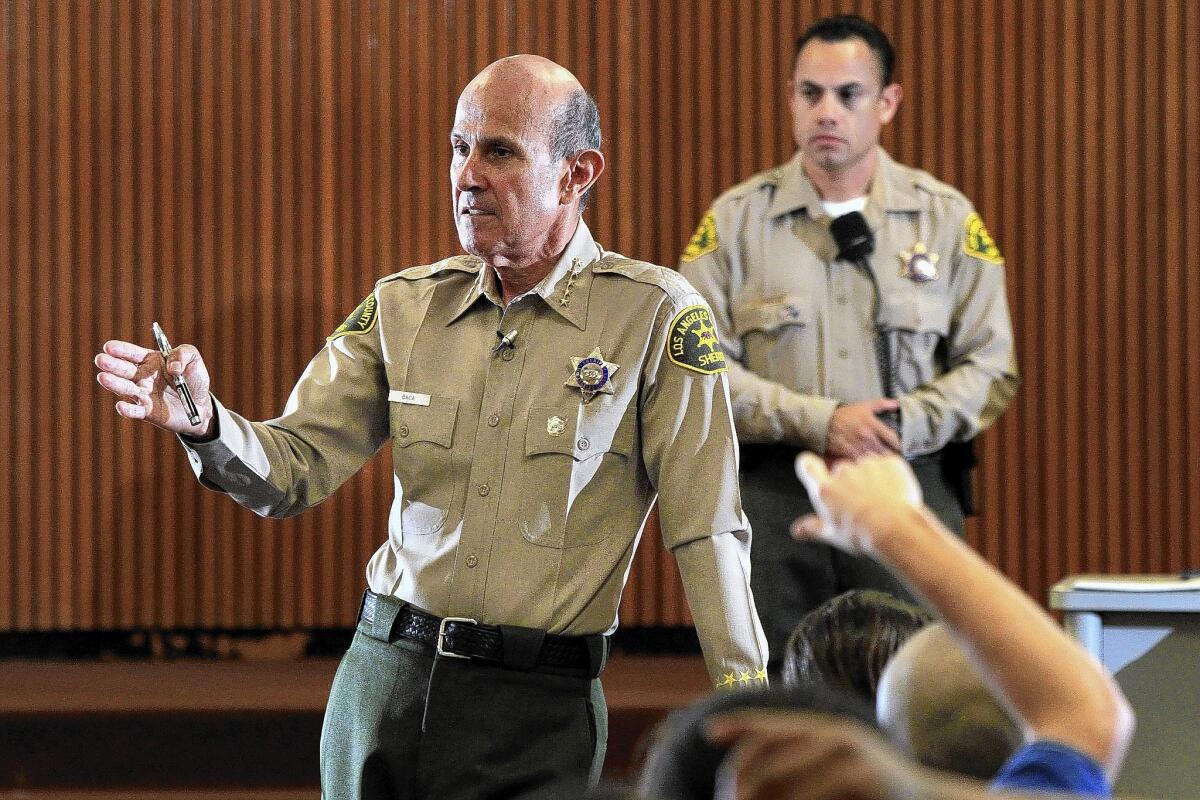In Sheriff’s Dept. trial, all fingers point to Baca

- Share via
Less than a week after failing to convince a jury that a young Los Angeles County sheriff’s deputy obstructed a federal investigation into the county jails, prosecutors faced a second panel Tuesday with the same facts in an attempt to convince jurors that six others in the department had indeed been part of a conspiracy to foil the inquiry.
Jurors deadlocked 6 to 6 Thursday in the trial of Deputy James Sexton, who was among the most junior of the seven indicted in the case, including two sergeants and two lieutenants. Sexton’s attorneys repeatedly emphasized that the deputy had been out of the academy for only three years, and argued that he was following orders when he moved a federal informant around in the jails and kept him from the FBI.
------------
Sheriff’s Department: An article in the June 7 LATExtra section about the obstruction of justice trial of six Los Angeles Sheriff’s Department officials misspelled the first name of one of the defendants, Maricela Long, as Maricella. The misspelling also occurred in articles Dec. 10, Dec. 17, May 20, May 28 and June 5.
------------
Attorneys for the six remaining deputies whose trials began Tuesday each directed the blame at the very top: former Sheriff Lee Baca.
“Sheriff Baca’s philosophy is we police ourselves,” said David Stothers, attorney for Lt. Gregory Thompson, who was Sexton’s supervisor at the time. “This was a lawful, legitimate, directed, mandated investigation ordered by Sheriff Lee Baca,” said attorney Michael Stone, who is representing Sgt. Scott Craig.
Thompson, Craig and others stand accused of conspiracy and obstruction of justice based on the events of August and September 2011, after deputies at the jail discovered an inmate with a cellphone that had been smuggled in by FBI civil rights investigators.
Assistant U.S. Atty. Lizabeth Rhodes said that when agents began interviewing inmates after receiving a letter about violence in the jails, it soon became clear there was a “pattern” of unprovoked beatings by deputies at county jails run by the Sheriff’s Department. Inmates told them that deputies frequently yelled “stop resisting!” even when inmates weren’t fighting them, in an apparent effort to justify the use of force, Rhodes said.
“The FBI realized there were too many allegations out there for them to do nothing,” she said. “But how to investigate something that could be locked down, something that was controlled by the very people the FBI wanted to investigate?”
The prosecutor said the best option “presented itself” — an inmate, Anthony Brown, told agents that a deputy was offering to smuggle in a phone for a bribe, which would allow the FBI to gather “real-time” accounts. She said the FBI was in control of the phone and everything had gone according to plan until sheriff’s deputies found it during a routine search.
Each of the defendants, upon discovering that the phone was linked to the FBI, worked to keep Brown from his FBI handlers and to frustrate the investigation into the jails, Rhodes told jurors.
Thompson sent an email ordering that no one should have contact with Brown, especially outside law enforcement, without his approval. Deputies Gerard Smith and Mickey Manzo reportedly stood guard outside the inmate’s cell “not to keep Anthony Brown in, but to keep the FBI out,” moving him around from jail to jail to make him “unfindable.”
Lt. Stephen Leavins, along with Craig and Sgt. Maricella Long, tried to convince the corrupt deputy who had smuggled in the phone — Gilbert Michel — not to cooperate with the FBI, telling him that he was being manipulated and blackmailed, Rhodes said. And even after a local judge refused to sign off on a warrant for an FBI agent’s arrest, Craig and Long confronted the agent in front of her home, threatening to arrest her, Rhodes told jurors.
Smith’s attorney, William Genego, echoed Sexton’s defense team and berated the FBI for its decision to introduce the phone into the jails, saying that it was a “serious breach of security.” Brown also claimed that the FBI had smuggled drugs into the jails, leading deputies to believe it was orchestrated by a “dirty FBI agent,” Genego said.
“Sheriff Baca was upset; he could not believe the FBI would break the law to enforce the law,” he said.
His client was only a “foot soldier” complying with what he believed were lawful orders from above, the attorney said.
Stothers, Thompson’s attorney, said the same of his client: “He was doing what cops have done time and again, follow orders.”
More to Read
Sign up for Essential California
The most important California stories and recommendations in your inbox every morning.
You may occasionally receive promotional content from the Los Angeles Times.











